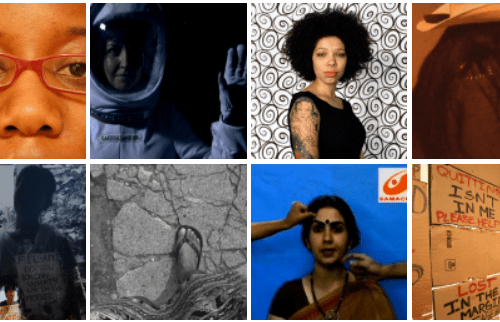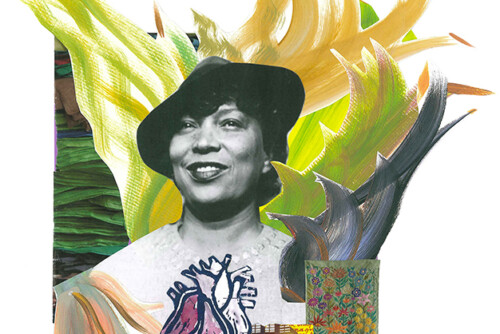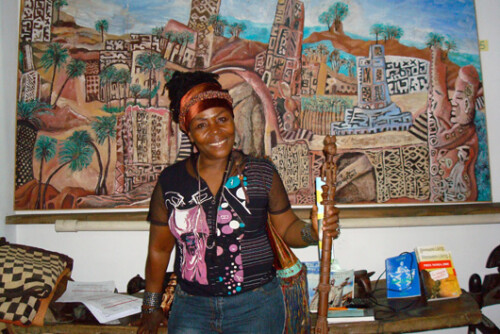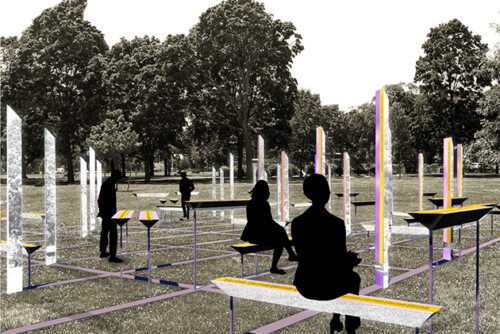After I give people a moment to tell the story of their voice to each other, I ask them to turn inwards and notice their breath. I ask, no matter what your mind is telling you, no matter what is going on around you, just breathe and allow yourself to feel your body—your feet on the floor, your butt on the chair. Feel the parts of your body that move with your breath, the obvious parts like your chest or your belly, and the subtler movements too—the shoulders, the neck, maybe even the hands, the thighs.
Visualize yourself in a bubble of gold shimmery light, and imagine that when you inhale that light pours into you, filling up your lungs, symbolizing all the amazing possibilities and potential and support the world holds for you. Notice how this feels in your body. Notice places in your body that are tense or painful, and when you exhale, visualize that tension, along with any negativity or self-doubt leaving your body in a puff of black smoke, which dissipates, making room for more light inside you.
Watch your breath become longer, slower, and deeper. When you feel full, take one last deep breath, and then push it all out with a big long shhhhhhhh.
Now wait.
Keep waiting.
See what it’s like to be empty, to be without something you think you need. Imagine that you are an embryo, floating, perfect and supported, drawing in everything you need through your skin, completely whole and symbiotic with the world. Watch your body as it prepares to take a breath, knowing that it is available to you whenever you need it. Your stomach starts to contract and pulsate, and finally, when you really need it, allow yourself a good, deep breath. Imagine this is your first breath. See where it travels inside you.
This exercise helps you create a body memory, of what it’s like to let go. So often we are walking around in the world with all this stale energy, stale air sitting around inside us. We don’t know what we have inside us, what we’re capable of, because we don’t know how to let go of things that don’t feed us. This openness, this depth, is something you can return to every time you sing. It is always available to you—your body, your breath, the reality of this moment.
That yearning I learned to channel in synagogue, that was the essence of what I was looking for, and it was the channel through which I searched. I wanted to feel myself, to access my body, to experience myself as whole, to funnel my dreams into sound, to be recognized and accepted. Musical theater gave me a space to dramatize that yearning, to seek the approval I so desperately believed I needed. At sixteen I played in my first band, and found that musical theater and Hebrew prayers had not prepared me for punk rock. I needed to be louder, madder, more aggressive. I imitated the bratty high-pitched sing song of the riot grrrl bands I looked up to in my community. I wanted to sound like Kathleen, Allison, Corin. I strained to be heard over the amps and drums. As I got older, I found that the strain of forcing my voice, combined with the stress of expectation, meant that I would always lose my voice when I had to perform.
When I wrote a rock opera in 2000, I found myself in a position having to teach other people how to sing my songs. This meant working with them to get the sound that I wanted, doing warm-ups together as a group, remembering to take care of my own voice so that I could help others take care of theirs. As a teacher, I found myself asking things like, where in your body can you find the most authentic sound? How can you honor your voice and let it sound natural, not forced? What parts of you have to open to let it out?
I explored these questions in myself, and began to work more directly one-on-one, often with students who have been told since childhood that they are tone-deaf or can’t sing. In my experience, everyone who I’ve worked with is capable of finding a note, holding it, and making a nice, resonant sound. The key is to let go, stop thinking so hard about it, just find the space of the note; locate yourself inside of it. You can tell when you are there, you just have to feel it.



